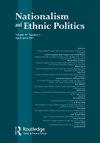Central Peripheries: Nationhood in Central Asia
IF 1.1
Q3 ETHNIC STUDIES
引用次数: 5
Abstract
women and men more clearly would have helped bring forward the human, rather than group-based, dimension of the “Armenian issue.” Thus, the perspectives of ordinary people get lost throughout the book. In this regard, Zabel Yesayan, an Armenian novelist, is worth mentioning in a detailed way because she was the only female intellectual targeted for arrest and deportation by the CUP. Centrally, the importance of political context that influenced the Turkish government’s approach is not clearly laid out throughout. While mentioning Turkish intellectuals’ anti-Armenian attitude, Cheterian refers to their support for Yaşar Kemal, a landmark name in Turkish literature, due to his comments criticizing state policies against the Kurds. According to the author, the same intellectuals were never interested in the “Armenian issue,” and so they were all distant (p. 137). This argument is ambiguous partly because Cheterian ignores the novelty of the “Armenian issue” for Turkish intellectuals. The final point is related to the editing of the book. Some Turkish words, including proper nouns, are misspelled and could be easily spotted by a native Turkish corrector. To conclude, Open Wounds shows how the past influences today through the critical aspects of the reception of the “Armenian issue.” It is a valuable and insightful analysis that could be beneficial to the general audience and the experts of the topic. It also reveals what the literature needs: a complete, thorough, and well-rounded historical evaluation of intellectual debates about the issue because not only the factuality but also how this issue has been debated through time provides us the strategies to heal the bleeding wounds.中心边缘:中亚的国家地位
女性和男性更明确地有助于提出“亚美尼亚问题”的人性层面,而不是基于群体的层面。因此,普通人的视角在整本书中消失了。在这方面,值得一提的是亚美尼亚小说家扎贝尔·叶萨扬(Zabel Yesayan),因为她是唯一被CUP逮捕和驱逐出境的女性知识分子。最重要的是,影响土耳其政府做法的政治背景的重要性在全书中没有得到明确阐述。Cheterian在提到土耳其知识分子的反亚美尼亚态度时,提到他们支持土耳其文学史上具有里程碑意义的名字yyazuar Kemal,因为他批评了针对库尔德人的国家政策。据发件人说,这些知识分子对“亚美尼亚问题”从不感兴趣,因此他们都很疏远(第137页)。这个论点是模棱两可的,部分原因是Cheterian忽略了土耳其知识分子对“亚美尼亚问题”的新鲜感。最后一点与这本书的编辑有关。一些土耳其词,包括专有名词,拼写错误,很容易被土耳其本土的校准员发现。最后,《敞开的伤口》展示了过去如何通过接受“亚美尼亚问题”的关键方面影响今天。这是一个有价值的和有见地的分析,可能对一般观众和该主题的专家有益。它也揭示了文学所需要的:一个完整的,彻底的,全面的,关于这个问题的知识辩论的历史评估,因为不仅是事实,而且这个问题是如何通过时间辩论的,为我们提供了治疗流血伤口的策略。
本文章由计算机程序翻译,如有差异,请以英文原文为准。
求助全文
约1分钟内获得全文
求助全文
来源期刊

Nationalism and Ethnic Politics
ETHNIC STUDIES-
CiteScore
1.30
自引率
0.00%
发文量
30
期刊介绍:
Nationalism & Ethnic Politics explores the varied political aspects of nationalism and ethnicity in order to develop more constructive inter-group relations. The journal publishes case studies and comparative and theoretical analyses. It deals with pluralism, ethno-nationalism, irredentism, separatism, and related phenomena, and examines processes and theories of ethnic identity formation, mobilization, conflict and accommodation in the context of political development and "nation-building". The journal compares and contrasts state and community claims, and deal with such factors as citizenship, race, religion, economic development, immigration, language, and the international environment.
 求助内容:
求助内容: 应助结果提醒方式:
应助结果提醒方式:


